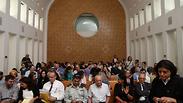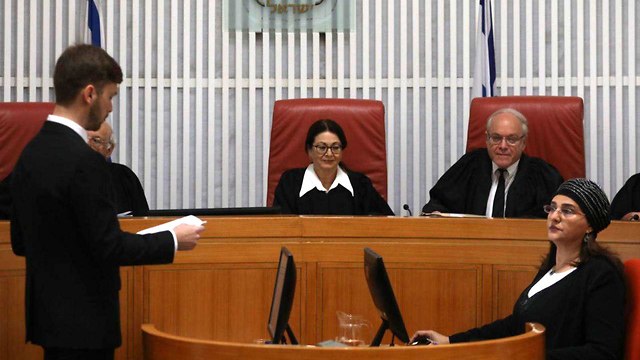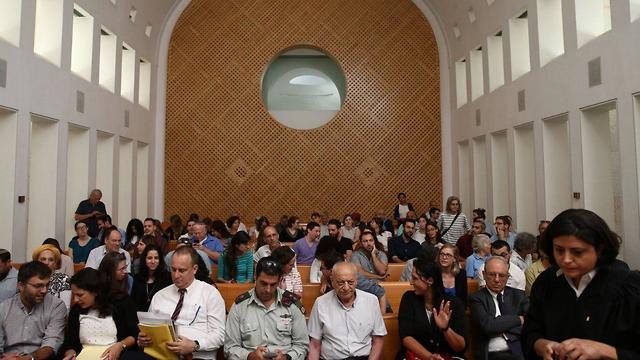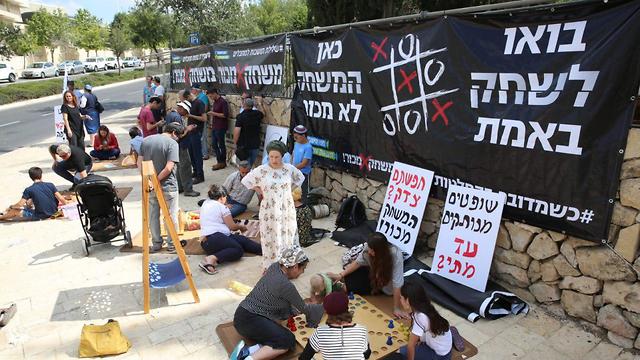

AG rep. tells HCJ Regulation Law harms Palestinian rights
During High Court review of petitions against controversial law seeking to retroactively legalize West Bank outposts, Aner Helman complains there is ‘no balance’ in the law, conveys message that Attorney General Avichai Mandelblit deems the law 'unconstitutional, null and void.'
A representative of Attorney General Avichai Mandelblit told the High Court of Justice (HCJ) Sunday that the Regulation Law, which retroactively legalizes goverment-backed outposts in the West Bank, harms Palestinain rights over the lands.
The comments were made during the HCJ's review of petitions submitted by Palestinian local councils and left-wing organizations against the Regulation Law, with dozens of attorneys and left-wing and right-wing activists in attendance.
The hearing was presided over by an unusually broad panel of nine justices headed by Supreme Court Chief Justice Esther Hayut.
The issue has brought to the fore of Israeli political discourse the ongoing debate about the division of power beweteen the legislative and judicial branches.
Legal adviser to the Knesset, Attorney Eyal Yinon said during the hearing the "The Regulation Law was formulated in the wake of the Israeli governments' problematic conduct which created an intolerable gap between the law and the reality on the ground.
"Many MKs feel they can't stay quiet and abandon the settlers as they deal with the ongoing government's failures. The solution to the problem involves the use of unconventional legal tools," the legal adviser to the Knesset added.
The law seeks to regulate the status of thousands of homes in settlements located on land privately owned by Palestinians, amounting to around 2,000 homes.
According to the text, the state will transfer the rights of the lands’ use to the Commissioner of Government Property in the West Bank while Palestinian landowners will be compensated with a financial package amounting to a sum exceeding the land’s actual worth, or receive alternative plots in accordance with their choice.
"If the HCJ decides to strike down the Regulation Law, maybe it should allow the legislative authority to amend the law while providing (specific) guidelines," Yinon went on to say.
Private Attorney Harel Arnon, who represents the government in defending the Regulation Law since Attorney General Avichai Mandelblit is one of the law's main opponents, argues the law should not be struck down.
"The matter reviewed is not an administrative procedure executed by one official or another but rather a law legislated by the Knesset," Arnon explained.
"If the main allegations regarding international law are accepted, those petitioners are asking the HCJ to cooperate with a regime coup rather than a juridical one," he added. "This amounts to dismantlement of the Knesset's sovereignty. The Knesset has the right to dictate the rules of the games of the legal system," the attorney stated.
"This law expresses assuming responsibility. Over the past 15-20 years, the state has given its voice to at least two different stances regarding Judea and Samaria, due to the domestic and international political complexity of the situation," Arnon stated.
"The state has encouraged and helped in training, infrastructure and funding the expansion of communities (across the West Bank) even those these activities are known to be contain illegal defects of one kind of a degree or another," he concluded.
The attorney general's representative in the hearing, Attorney Aner Helman, said that Mandelblit's office has allowed the government to hire a private attorney and added, "In the attorney general's opinion the Regulation Law is null and void."
"In the attorney general's view, the dominant feature of this law is insensitive to human rights of those whose rights were violated—the Palestinian resident who have rights over the lands. There is no balance," he said.
"Neither the Palestinians' nor the Israeli citizens' right to property is absolute, but the Regulation Law's purpose is not to strike a balance (between the two) but to mainly promote the regulation for the betterment of Israeli settlements," he determined.
The Regulation Law passed in the Knesset's second and third readings with the majority of 60 MKs backing it and 52 opposing it in February 2017.
In August 2017 HCJ Justice Neal Hendel issued a temporary interim order against the Regulation Law pending a ruling on a series of petitions filed against the law.
After the Knesset had approved the law, Attorney General Mandelblit announced that he will not be able to support the Regulation Law in the HCJ since it violates Basic Laws.
A few months ago, Mandelblit said to the HCJ that it had to be accepted that the law is unconstitutional.
"One cannot escape the juridical prnonouncements describing the Regulation Law as unconstitutional, null and void," the attorney general declared.
"This is a harmful law which would not stand up to the test of proportionality," Mandelblit concluded.


















